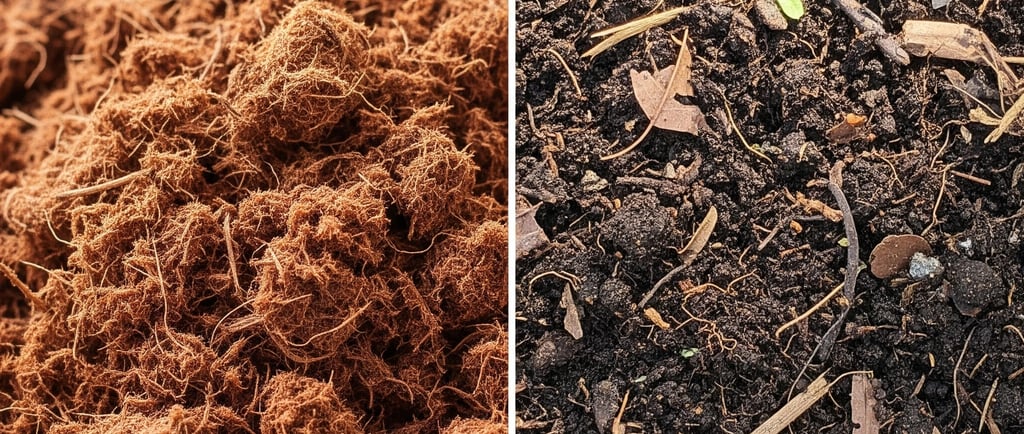🔥 Cocopeat vs. Regular Soil: Why International Buyers Prefer Cocopeat
coconusaindo
7/28/20253 min read


In the global horticultural market, the choice of growing media is a critical decision for growers aiming for optimal yield, efficiency, and sustainability. While traditional soil has been the backbone of agriculture for millennia, cocopeat is increasingly becoming the preferred choice, especially among international buyers and commercial growers. But what makes cocopeat so superior that it's challenging the dominance of conventional soil?
A study by Aftafia, Chatri, Hijrah Selaras, & Vauzia (2022) explored the effectiveness of cocopeat as a planting medium for air layering, highlighting its benefits for plant propagation. This research, among many others, underscores the distinct advantages cocopeat offers over traditional soil in various applications.
🌿 The Limitations of Traditional Soil
Traditional soil, while natural, comes with inherent challenges that can be significant for large-scale or specialized growing operations:
Inconsistent Quality: Natural soil varies widely in composition, nutrient content, pH, and drainage across different regions and even within the same plot. This inconsistency makes it hard to standardize growing practices.
Heavy and Bulky: Soil is naturally heavy, making transport costly and laborious, especially for international shipping.
Pest and Disease Risk: Soil can harbor pathogens, weeds, and pests, requiring sterilization or chemical treatments that add cost and environmental concerns.
Poor Drainage/Aeration: Depending on its composition (e.g., heavy clay), soil can become waterlogged, leading to root rot, or too compacted, hindering root development.
Non-Renewable (Locally): While dirt is everywhere, quality topsoil takes centuries to form and can be easily depleted or degraded, raising sustainability concerns.
✅ Cocopeat's Winning Advantages for Global Growers
Cocopeat addresses many of these challenges, offering a consistent, reliable, and eco-friendly alternative that appeals to international buyers focused on efficiency and sustainable practices:
1. Superior Water Management & Aeration
Exceptional Water Retention: Cocopeat can hold 8-9 times its weight in water, ensuring consistent moisture for plants, reducing watering frequency, and minimizing water waste. This is crucial for efficient irrigation systems.
Excellent Drainage & Aeration: Unlike compacted soil, cocopeat maintains a loose, airy structure even when wet. This ensures optimal oxygen supply to roots, preventing waterlogging and promoting healthier root development, which is vital for hydroponic systems and container gardening.
2. Consistent & Predictable Medium
Uniform Quality: Cocopeat is a processed product, allowing for standardized quality control. This consistency ensures predictable plant growth and simplifies nutrient management for commercial operations, regardless of where it's sourced globally.
Neutral pH: Typically, cocopeat has a neutral pH (5.5-6.5), making it suitable for a wide range of plants and reducing the need for extensive pH adjustments, unlike often unpredictable natural soils.
3. Lightweight & Cost-Effective for Shipping
Highly Compressed for Transport: Cocopeat is usually sold in compressed bricks or bales, drastically reducing its volume and weight for shipping. This makes international logistics far more cost-effective compared to transporting bulky, heavy bags of soil.
Reduced Labor Costs: Its lightweight nature also makes it easier to handle, mix, and fill pots, leading to labor savings in large-scale nursery and greenhouse operations.
4. Disease & Pest-Free
Sterile Medium: Cocopeat is naturally sterile when processed, meaning it's free from soil-borne diseases, weeds, and pests. This provides a cleaner start for plants and reduces the need for chemical treatments, aligning with organic growing practices and food safety standards.
5. Sustainable & Renewable Resource
Agricultural Byproduct: Derived from coconut husks—an abundant waste product of the coconut industry—cocopeat is an incredibly renewable and eco-friendly resource. Its use reduces waste and lessens reliance on peat moss or other non-renewable soil components, appealing to environmentally conscious buyers.
📈 Global Impact: Why Cocopeat is the Future
The shift from traditional soil to cocopeat is a global trend driven by the pursuit of efficiency, sustainability, and consistency in agriculture. For international buyers, cocopeat offers a reliable, high-performing, and environmentally responsible growing medium that supports modern farming techniques, from hydroponics to containerized nurseries. Its ability to deliver superior plant health while streamlining logistics and reducing environmental footprint makes it the clear choice for the future of horticulture.
📌 Reference
Aftafia, R., Chatri, M., Hijrah Selaras, G., & Vauzia. (2022). Pengaruh Media Tanam Lumut dan Cocopeat terhadap Keberhasilan Pencangkokan Tanaman Buah Ajaib (Synsepalum dulcificum). Jurnal Serambi Biologi, 7(4): 392–396.
🚀 Ready to Elevate Your Garden with Cocopeat?
Are you a gardener seeking a superior and sustainable growing medium? Or a commercial grower looking for a clean, efficient, and eco-friendly alternative for your plants?
💼 Coco Nusa Indo is here to connect you directly with vetted local producers in Indonesia—no hassle, no middlemen. As a neutral and trusted independent broker, we help you source better, faster, and more reliably.
🔗 Get in touch today at www.coconusaindo.com and let us help you find the best cocopeat straight from the source.
🌱 Transforming agricultural waste into thriving gardens.
Our social media
Connecting local producers with global markets.
Contact us
Email Us
Coconusaindo © 2025. All rights reserved.
